I wrote this article in Japanese and translated it into English using ChatGPT. I also used ChatGPT to create the English article title. I did my best to correct any translation mistakes, but please let me know if you find any errors. By the way, I did not use ChatGPT when writing the Japanese article. The entire article was written from scratch by me, Saikawa Goto.
Introduction
Movies and books covered in this article

I will write an article about this movie/book
What I want to convey in this article
It makes you imagine the sadness of a life where you have to take the lives of others to “survive”.



I think there is also a commonality with modernity, where the pursuit of desire leads to isolation.
Three takeaways from this article
- The suffering of “what it takes to survive” being a “crime” like “pedophilia” or “addiction”.
- How should we live in a world where the pursuit of desire accelerates isolation?
- Imagining the heroic life of Eli and the backstory of the person called “Dad.



During the movie, I didn’t realize that the “mosaic” meant such a “deterioration.”
Self-introduction article


Please refer to the self-introduction article above to learn about the person writing this article. Be sure to check out the Kindle book linked below as well.


Published Kindle books(Free on Kindle Unlimited)
“The genius Einstein: An easy-to-understand book about interesting science advances that is not too simple based on his life and discoveries: Theory of Relativity, Cosmology and Quantum Theory”
“Why is “lack of imagination” called “communication skills”?: Japanese-specific”negative” communication”
The quotes used in this article are based on notes taken at the movie theater from movies in Japanese and are not direct quotes from the foreign language original movies, even if they exist.
Can We Really Watch the Movie “Let the Right One In,” Which Depicts a Situation Where “One’s Own Survival cannot be Achieved Without Hurting Others,” as if It Were Someone Else’s Problem?


I had heard of “Let the Right One In” and knew that it was highly acclaimed, so I watched it. It turned out to be a remarkable movie. It’s a work with a setting that could be called “science fiction,” but it also strongly portrays the “pain that ‘what it takes to survive’ is not sympathetic to anyone “among others.
In that sense, I felt that the life depicted in this movie is not something that can be thought of as “someone else’s problem.”
About the Despair of Having “One’s Own Deep Desires” Considered a “Crime”
While watching this movie, I couldn’t help but think, “I’m glad I’m not a ‘pedophile.'” The movie “Let the Right One In” is not about pedophilia. However, if you just look at the situation where “what one feels is necessary to survive” is considered a “crime” by society, it can be said that it is the same.





re to replace the movie’s setting with our real world, “pedophilia” would be the most understandable.
…
However, I think it might not be a good idea to talk about “pedophilia,” so I thought of another example. Although the situation may be slightly different, so-called “addiction” may be similar to the situation that this movie suggests.
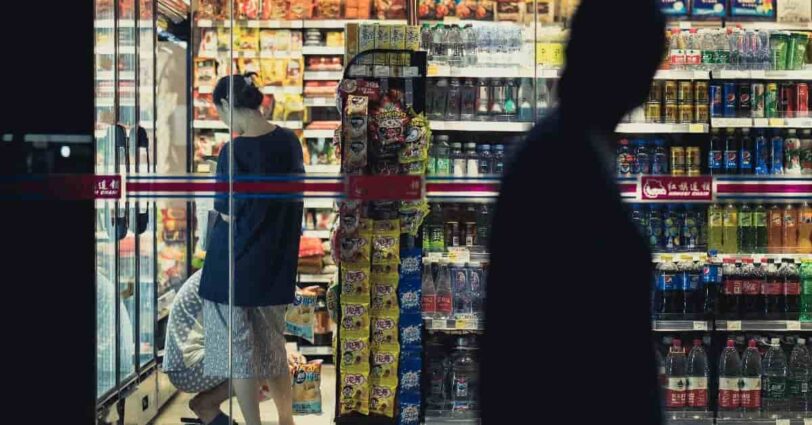

For example, there is something called “shoplifting addiction.” As the name suggests, it is a disease of “habitually shoplifting,” also known as “Kleptomania.” Many people may have learned of its existence when it was reported that former Japanese representative of the women’s marathon, Hara Yumiko, was suffering from this “shoplifting addiction.”


“Shoplifting” is clearly a crime. However, the criminal act has become so habitual that one cannot stop oneself. It must be a very difficult situation. “Addiction” should generally be judged as a “disease”, so it is not something that one feels is “necessary to survive”. But I think you can somehow understand what I’m trying to say.



It could be gambling or alcohol or anything, but I imagine “addiction” would be really tough.
I’ve heard that the brain can get metamorphosed, and it’s not something that can be changed by willpower.
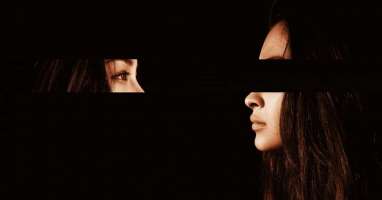

Regardless of whether they want to shoplift or not, they are already in a situation where they feel like “life cannot go on without shoplifting.” Perhaps they understand that shoplifting is a bad act and that they are in a difficult situation. However, they still cannot stop themselves from shoplifting.
Also, if we shrink the scale of the story a bit, there are many situations where “one’s desires and hopes” become “a nuisance to others,” such as “wanting to skateboard but it gets in the way of others practicing in the ideal park” or “wanting to play a musical instrument but being a nuisance to the neighborhood because it’s an apartment.”
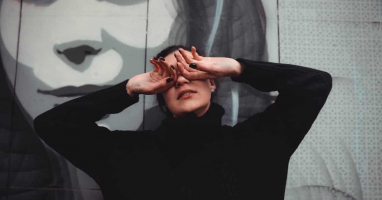

It can be said that Eli depicted in the movie is the ultimate existence. For her, “survival” is synonymous with “bringing others to death.” It truly feels like a tremendous situation.



I don’t think I would be able to stand it, because I hate it so much when someone else cannot help but to do something for me.
If your life became one where you had to be cared for you would want to die quickly, wouldn’t you.


The Despair of “Not Being Able to Match the Sensation of Desire with Others”
Now, Eli’s situation is too unique, so let’s try to broaden the situation a bit.
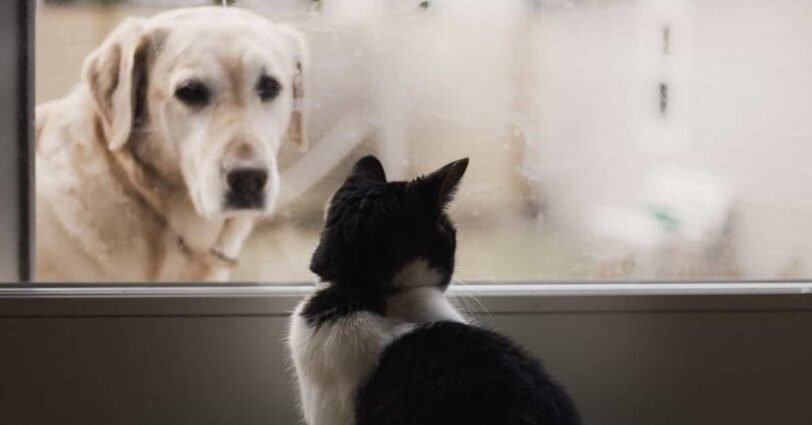

Because of his particular way of life, I think Eli would have a hard time coming to a sense of “understanding each other. The more she focuses on “what is important to her,” the more she will be unable to communicate with those around her.
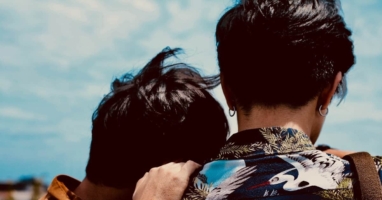

And this is still the case in modern times with many similar situations existing.
A female otaku who used to work in the same workplace once said something very interesting. She wanted to talk about otaku things that she was passionate about with someone who had absolutely no knowledge about it. I, being a person who had no otaku knowledge, was the perfect person for her to talk to in that sense, I think.
Why did she think that way? It’s because “even if you both like the same anime, game, or manga, it’s rare for her ‘liking points’ to overlap perfectly.” People who share the same hobbies would have a clear “I like this part of this” point each other. And unless they are very lucky, it is rare for those points to match up completely. She also said things like, “Even if I like the same things, I can argue about the ‘liking points.'” So she prefers to speak passionately to people like me who know nothing about it.





I heard this story over 15 years ago, but I still remember it as a memorable episode.
She was quite different, so this might not be a feeling that is generally agreed upon.
I also remember a conversation I had with a girl I often go drinking with recently. We talked about not wanting to connect with people through our hobbies, and I felt a strong sense of empathy.
These stories can be summarized as “the more we pursue what you ‘like,’ the more isolated we become.” I think there are quite a few people who feel this way.


In this case, there are two options: “pursue desires and become isolated” or “give up pursuing desires (or not speak of being pursuing desires) in order to avoid isolation.” Recently, there are many people who make “pursuing desires” their main purpose in life, such as “living for their OSHI (Something that we like so much that we also want to recommend it to others).” For these people, “pursuing desires” should be directly linked to “survival.” Therefore, the choice to “stop pursuing desires out of fear of isolation” is not possible.


When I think about it like this, I think Eli’s “loneliness” can feel very real.
“Who are you?”
“Same as you.”
“I won’t kill you.”
“But you want to, don’t you? You want to live even if it means killing someone else.”
“Yeah.”
Many of us, myself included, are fortunate enough to not live a life where “the pursuit of desire” leads to “taking the lives of others,” so we may not face the difficulties depicted in this movie. However, while it may be unlikely for us to be the same as Eli, there are surely many people in the world who have been placed in similar circumstances as Eli.
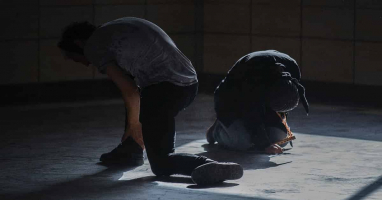

If the urgency of “the pursuit of desire is necessary for survival” doesn’t come across, people might come up with unimaginative opinions like “it’s not necessary to live.”



While condemning “causing trouble for others,” we need to acknowledge that “the pursuit of desire is important.”
So, how should we coexist when we have to live in the same society as “those whose ‘pursuit of desire’ is directly connected to ‘the destruction of others,'” as in this movie?


Content Introduction
The movie begins by accumulating many “seemingly unrelated fragments”.
Oskar is being bullied at school. To try to drown out his frustration, he repeats the words said by the bully every night with a knife in hand. He is a boy burdened with darkness, who also collects newspaper clippings reporting on murder cases.


A man stands on a deserted street at night with a bag containing gas that can knock people unconscious. Pretending to ask for the time, he makes a man smell the gas and then hangs him upside down from a tree with a rope. The man cuts his throat and collects their fresh blood in a bucket. While in the middle of this, a dog owned by someone nearby approaches. Feeling the danger of being seen committing a crime, the man leaves the scene.
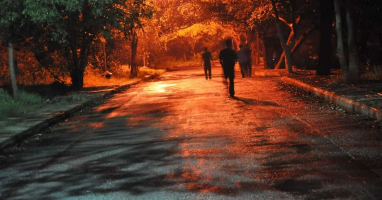

A few regular customers are chatting at the restaurant. They invite a man who seems to have recently moved in and is eating alone at the next table to join them for a drink, but he refuses. After their gathering ends, they each head home. One of them hears a girl’s voice calling for help while walking on a dark street. As he approaches to lend a hand, a piercing scream shatters the silence.
Oskar is playing in the courtyard attached to his apartment. Suddenly, he notices a girl standing near the jungle gym who he’s never seen before. She’s dressed very lightly in the bitter cold of midwinter snowfall. Oskar tells her, “You stink,” but lends her his Rubik’s Cube and says goodbye for the day. It turns out her room is next to Oskar’s, separated only by a wall.
During class, Oskar is copying something from a thick book he likely borrowed from the library. It’s Morse code.


Impression
Until now, I have kept it secret, but I think it’s a well-known fact that Eli is a “vampire,” so I will write this article without hiding that fact. The Japanese subtitle “200歳の少女(200-year-old girl)” can also be seen as an indirect hint that she is a vampire.
The original title of this movie is in Swedish, but the English title, which is probably a direct translation of it, is “Let the Right One In.” I felt that it meant “Take in blood, not something humans eat,” and I felt it was a crazy title.
Well, I think this interpretation would not be bad either.



But in the end, it’s wrong.
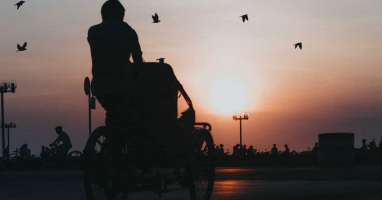

The title of “Let the Right One In” actually means “invite the right person in”. It seems that there is a setting where vampires cannot enter a room without permission, and in the movie, there is a scene where Eli says “Say you can come in”. It was a mysterious scene for me who didn’t know much about vampires, but I later understood it after researching it. And such a setting is reflected in the title.


Considering that the English title has this meaning, it would be said the “Eli being a vampire” is a story that unfolds as a “preexisting fact.”
Now, there is a point in the Japanese version of this movie that is heavily criticized, but I did not know about that fact for a while after finishing the movie. Therefore, I would like to write about my impressions of the movie first, and then touch on that point at the end.



I was researching about the film for this article and stumbled upon the “criticism” about it.
I didn’t know anything about it, but I think the “modification” was not good.
The story mainly focuses on the relationship between Eli and Oskar. The exchange between two incompatible people, a vampire and a human can be described as both terrifying and beautiful, alluring and full of distortion. It’s a relationship that makes you feel unsure if you can even call it “pure love”, and the unstable and mysterious interaction between the two makes the entire movie very captivating.


Now, I think it’s best to experience and feel those things by actually watching the movie. What I was curious about was the person that Eli calls “Dad.” I kept wondering who he could be while watching the movie.
At a relatively early stage, I thought “he’s probably not her biological father.” But the moment I became confident of that was during the scene where the man said,
Don’t meet that boy tonight. Please.


Considering the development before and after this scene, I think the man had some kind of “premonition” and understood that he was in a situation where his “death” was unavoidable. And in that scene, he speaks words that would clearly be interpreted as “jealousy”.
That scene was really sad.



Especially when I think about what the man is doing for Eli.


If it is indeed “jealousy,” there is one possible explanation: this man and Eli were originally of the same age. The man aged while Eli did not, resulting in this “age difference.” Considering Eli’s statement, “I’ll always be 12 for a long time,” the fate of the woman bitten by Eli, and the Japanese subtitle “The 200-Year-Old Girl,” I believe Eli has the following setting:


Eli was bitten by a vampire when she was 12, but survived. However, she also became a vampire and became an existence that never ages. Eli found an “existence that supports her” at each time and lived together as a fate community. And, by regularly changing that “fated community,” she has survived for over 200 years.
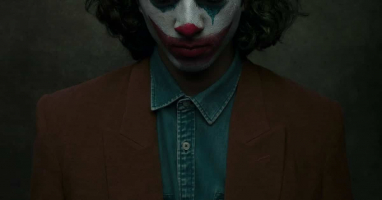

In a certain paper that appears in the play, the following words were written.
Be gone and live, or stay and die.
Living with Eli means choosing a life of wandering. In Eli’s living area, many suspicious deaths occur, so it is not possible to stay in one place for long. So the decision to “Be gone and live, or stay and die” will be thrust upon those who decide to live with Eli. And on that same paper, “My Eli” was written, and I think this became the origin of the Japanese title.


This makes me realize the strength of Eli’s desire to “survive.”



If I were in Eli’s position, I don’t think I could feel like “surviving.”
In other words, a simple summary of the film “Let the Right One In” would be “Eli, who has lost her fate community, sets her sights on Oskar.” However, I felt that the film was made without such any “calculating” atmosphere. I think it’s a miraculous masterpiece that has come together in a very delicate balance.
Now, let’s talk about the “criticism of the Japanese version” that I promised earlier and end this article.


There was a scene in the movie where a mosaic was placed. It was over Eli’s naked genitals. When you watch it normally, you might think, “It’s not necessary to be so sensitive about it, but maybe they judged that mosaic was needed.” That’s what I thought too, and I didn’t feel anything in particular.


But in fact, this mosaic changes the essence of the work fundamentally. In the uncensored version shown in Sweden, there is a “castration scar” in Eli’s genital area. In other words, Eli is not a “girl” but a “boy”. Knowing this, you will feel malice in the Japanese subtitle “200 year old girl”. It seems obvious that the film is trying to mislead the audience into thinking that “Eli is a girl”.


I wonder why someone made such a mysterious decision, but did the film director give the OK?



I don’t think they could have released it without approval. Maybe the situation was like, “If you don’t accept this ‘a change for the worse,’ you can’t show it in Japan.”
If Eli is a male and Oskar decides to go on an escape journey after knowing it, the story will be perceived as something of a higher dimension. It’s not just a simple boy meets girl story, but a tremendous decision made after overcoming all kinds of differences and difficulties. I don’t know why someone would deliberately try to cover up such a story, but perhaps in 2010 when it was released in Japan, things like LGBTQ+ might have been not widely accepted as much as now. Even so, I watched this movie in 2022, and I can’t help but think that a decision could have been made to remove the mosaic to match modern times.


The fact that the extremely important message that this work suggests was completely erased by the mosaic and subtitles feels very sinful.
Conclusion
It was a wonderful work with unpredictable developments and a relationship between two people that is difficult to call “pure love”. While pushing both “cruelty” and “beauty” to the forefront, it is a masterpiece that depicts the struggle of “survival” head-on.


Published Kindle books(Free on Kindle Unlimited)
“The genius Einstein: An easy-to-understand book about interesting science advances that is not too simple based on his life and discoveries: Theory of Relativity, Cosmology and Quantum Theory”
“Why is “lack of imagination” called “communication skills”?: Japanese-specific”negative” communication”







コメント